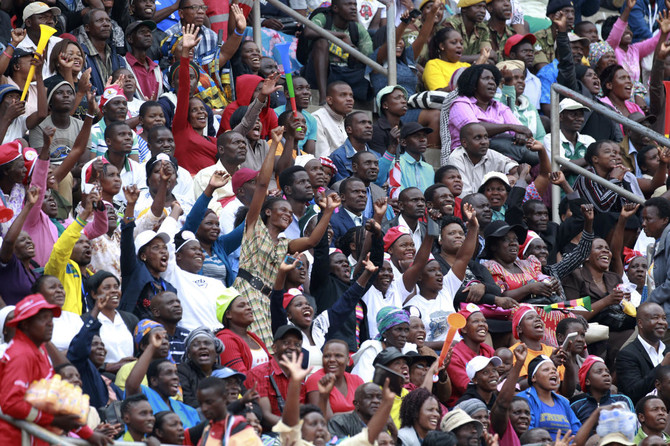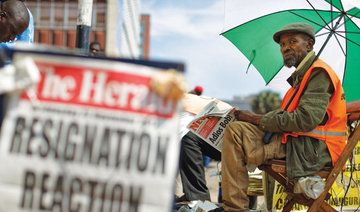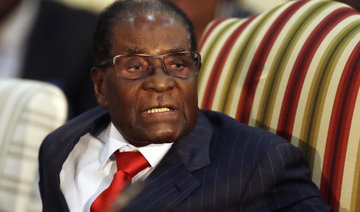HARARE: Emmerson Mnangagwa was sworn in as Zimbabwe’s president on Friday, marking the final chapter of a political drama that toppled his predecessor Robert Mugabe after a military takeover.
Mnangagwa, until recently one of Mugabe’s closest allies, took the oath of office at the national sports stadium on the outskirts of Harare before thousands of supporters, dignitaries and foreign diplomats.
Snipers took up positions around the stadium amid tight security as jubilant Mnangagwa supporters streamed in, many dancing as music played.
The man known as “The Crocodile” wore a dark suit, red tie and matching handkerchief, and a row of medals on his chest for the ceremony.
“We are excited and expecting a lot from Mnangagwa. We have been under a dictatorship for a very long time,” 23-year-old Sharon Mauyakufa said, referring to Mugabe.
“Mugabe is very old — we do not expect that he will be punished for his crimes. How do you punish a 93-year-old? But his wife and others must be charged if they committed crimes.”
The former president, who ruled the southern African country for 37 autocratic years, was ousted from office when the military intervened after he had sacked Mnangagwa as vice president.
“We thank you our soldier,” said one banner in the sports ground. “The people have spoken,” said another.
A group of elderly women dressed in blue and white gyrated in time to a big band to wild applause from the crowds.
Mugabe is in increasingly frail health and had been positioning his wife Grace as his successor, but the army chiefs acted to halt the plan and usher in Mnangagwa.
State-run media had earlier claimed that Mugabe may even attend his successor’s swearing-in — but later suggested that after he and Mnangagwa talked about the inauguration, he agreed he “needed time to rest.”
Mnangagwa also “assured him and his family maximum security and welfare” for their future as private citizens, the state-run Herald news site also reported.
Presidential spokesman George Charamba confirmed to AFP that Mugabe would not attend.
Buses brought well-wishers to the 60,000-capacity stadium from the early hours of Friday.
Leader of the main opposition Movement for Democratic Change Morgan Tsvangirai received rapturous applause as he arrived at the packed stadium for the swearing-in.
Opposition stalwart Joice Mujuru was also at the event at which military units stood in formation on a multi-purpose grass sports pitch, under the shadow of a big-screen TV.
Mnangagwa, 75, said this week that Zimbabweans were witnessing “a new and unfolding full democracy,” though critics say he is a ZANU-PF hard-liner who gained power in a de facto military coup.
He is known as “The Crocodile” for his ruthlessness and is accused of overseeing ethnic massacres by the army in the 1980s and the 2008 election violence when Mugabe was at risk of losing the vote.
At the inauguration ground, Zambian President Edgar Lungu and Botswana’s President Ian Khama both did a a lap of honor to huge cheers from the stands.
Zambian independence leader Kenneth Kaunda — who at 93 is the same age as Mugabe but is known as “Africa’s Gandhi” — received the largest cheer from the full-to-capacity stadium.
Britain, the former colonial power, said it had sent a junior minister to the ceremony.
Regional heavyweight South Africa said President Jacob Zuma would not be present as he was hosting a visit by Angola’s new head of state.
Mugabe had ruled since Zimbabwean independence in 1980, exercising almost total authority to crush any sign of dissent.
The majority of Zimbabweans have only known life under Mugabe — the world’s oldest head of state — during a reign defined by brutality, rigged elections and international isolation.
His iron grip on power ended on Tuesday when his resignation letter was delivered to parliament, where MPs had convened to impeach him.
Mugabe was last seen in public on Friday and gave a defiant televised address on Sunday.
Neither he nor his wife Grace has been seen since, though they are expected to be given protection by the government.
















